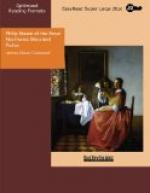“It made me a—a—almost a criminal,” he continued. “I had no good thoughts for humanity, beyond my small endeavors in my little field of science. I was a machine myself, cold, passionless, caring little for women—thus proving, if I had stopped to consider myself, the unreasonableness of my own theory. Coolly and without a thought of the consequences, I set out to prove myself right. When I think of it now my action appalls me. It was heinous, for the mere proving of my theory meant misery and unhappiness for those who were to prove it to me. I was not cramped for money. So I determined to experiment with six machines—three young men and three young women. I planned that each person should be unconscious of the part he or she was playing, and that each pair should be thrown constantly together—not in society, mind you, for my theory was that conditions must be right. Through a trusted and highly paid agent I hired my people—the men. Through another, who was a woman, I hired those of the opposite sex. One of the young women was sent to an obscure little place a hundred miles back from the Brazilian coast, ostensibly to act as governess for the children of an American family which did not exist. To this same place, through the other agent, was sent a man, whose duty was to get information about the country for a party of capitalists. Do you begin to understand?”
“Yes, I begin to understand,” said Philip.
“This place to which they went was made up of a dozen or so hovels,” continued the doctor, resuming his nervous walk. “There was no one there who could talk or understand their language but these two. The consequence—conditions were right. They would be constantly together. They would either prove or disprove my theory that men and women were but machines of passion. I knew that they would stay at this place during the three months I had allotted for my experiment, for I paid them a high price. The girl, when she found no American family, was told to wait until they arrived. The man, of course, had plenty of supposed work to keep him there.”
“I understand,” repeated Philip.
“The second couple,” continued the doctor, forcing himself into a chair opposite Philip, “were in a similar way sent up here—to an obscure northern post which I have reason for not naming. And the third couple went to a feverish district down in Central America.”
He rose from his chair again, and Philip was silent while the doctor went to his great-coat and from somewhere within its depths brought out fresh cigarettes. His hand trembled slightly as he lighted one and the flare of the match, playing for an instant on his face, emphasized the nervous tension which he was under.
“I suppose you think it all very strange—and idiotic,” he said, after a few moments. “But we frequently do strange things, and apparently senseless ones, in scientific work. Madmen have made the world’s greatness. Our most wonderful inventors, our greatest men of all ages, have in a way been insane—for they have been abnormal, and what is that but a certain form of insanity?”




